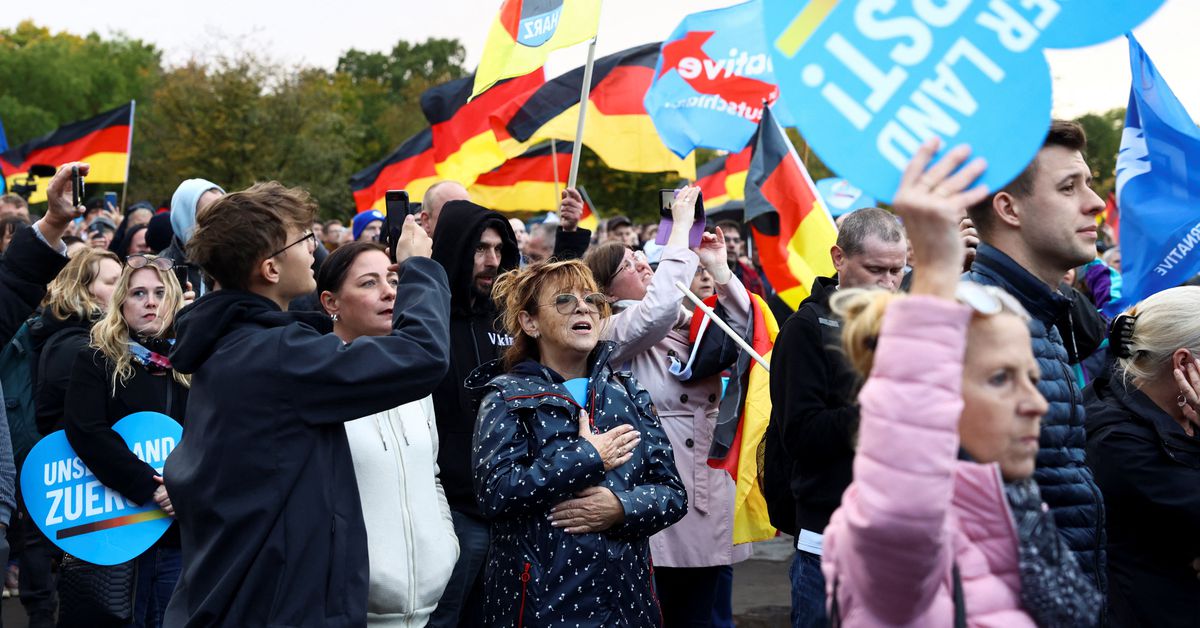BERLIN, June 25 (Reuters) - A far-right Alternative for Germany (AfD) candidate won a vote on Sunday to become a district leader in Europe’s biggest economy for the first time, a breakthrough for the party which has hit record highs in national polls.
The 10-year old AfD, with which Germany’s mainstream parties officially refuse to cooperate due to its radical views, won a run-off vote in the Sonneberg district in the eastern state of Thuringia with its candidate garnering 52.8% of the vote.
It is the latest success for the party which is riding a wave of popular discontent with Social Democrat Chancellor Olaf Scholz’s awkward coalition with the Greens and Free Democrats (FDP) which is dogged by infighting over policy and the budget.
Polling at 19%-20%, behind the opposition conservatives, the AfD is tapping into voter fears about recession, migration and the green transition, say analysts. It even plans to nominate a chancellor candidate in the 2025 federal election.
While far-right parties have gained ground around Europe, the strength of the AfD is particularly sensitive in Germany due to the country’s Nazi past.
The President of the Central Council of Jews in Germany, Josef Schuster, expressed deep shock.
“This is a watershed that this country’s democratic political forces cannot simply accept,” he told RND media.
Particularly strong in the former Communist East, polls suggest the party may win three eastern state votes next year.
A clear victory for the AfD’s Robert Sesselmann in the district, which has a population of only around 56,000 people, sends a signal to Berlin, say analysts, especially as all other parties in Sonneberg joined forces in a front against him.
Sesselmann was forced into a run-off against a conservative candidate after a vote two weeks ago. The conservative candidate won 47.2% on Sunday.
The party opposes economic sanctions against Moscow over the Ukraine war and disputes that human activity is a cause of climate change.
The domestic intelligence agency said this month that far-right extremism posed the biggest threat to democracy in Germany and warned voters about backing the AfD.
Formed a decade ago as an anti-euro party, its popularity surged after the 2015 migrant crisis and it entered parliament in 2017, becoming the official opposition. Reporting by Madeline Chambers; Editing by Chizu Nomiyama



It’s bad, but you could see it coming for a couple of years. It’s only a matter of time until they manage to win a state. I guess it’s going to be Saxony and/or Thuringia.
In my opinion there are two rules of thumb regarding voting population and politics in Germany and probably western countries in general:
A third of every population consists of morons who are easily deceived by right wing populists who manage to present themselves as the rebellious underdog. UK, France, USA, Sweden etc., you can see that everywhere. These people, for some reason I still fail to fully understand, are unable to make a connection between their legitimate feeling of betrayal through our current system (aka capitalism) and factual solutions. Instead they follow those who do not offer solutions and instead propose to make everything worse, but, like I said, manage to present themselves as the ones who “fight the system”. All right wing populists have something in common: They do not publicly say too much about what policies they are effectively going to implement, resulting in them being a huge canvas for every kind of projected wishes their voters have. That’s why Trump worked for conspiracy nuts, libertarians, religious extremists, right wing extremists, moderate conservatives, economically liberals and unpolitical dumbasses alike. Everyone of these factions could project what they wanted for society into what Trump would do, because aside from singular statements, Trump was actually pretty vague in what he wanted. The whole stupid “drain the swamp” theme is a perfect representation of what I mean. The AfDs motto in the last general election was “Germany, but normal”. The proposal of Brexit basically functioned like that, too. It was going to solve all the problems for whatever reason and enough people believed it.
About 10% of the German population (huge overlap with the proportion mentioned in 1.), and it might be the same for other western countries but i don’t know, are more or less openly fascist. These are the ones who profit from a “collective movement” that manages to assemble different parts of the political spectrum. This is different from a “big tent” approach where a compromise between related groups is thought to give them all a political representation.* This is not a new invention. The NSDAP functioned just like that. They managed to gather a huge chunk of the political spectrum around them, from nobility over capitalists over nationalists to liberals deep into the the political left. There were even former social-democrat and communist groups that merged into the NSDAP. I had a pretty illuminating chart about that, but i can’t find it online. The AfD works just like this. They have a fascist wing (literally called “Flügel” = “wing”), evangelicals, nobility, conspiracy nuts, economically liberals, former SPD and Linke-politicians and voters. They are united in their refusal of migrants, but that is pretty much all they can agree on. The new district leader of Sonneberg is a member of the “Flügel” and I’m sure all of the future ones will be, too. The “Flügel” is pretty effective in bullying everyone else out of important positions or even the party.
Now the governmental situation plays into their hands. It’s the first government that consists of three parties that in parts have diametrically opposed ideologies and policies. It was clear from the beginning that there would be a lot of friction happening. They openly argue about urgent topics, most recently about a proposed heating-reform, now passing over to a debate about the EU migration reform. While you can dislike aspects of the form of these debates, in my opinion they are, in essence, a sign of a healthy democratic culture. But the problem is that the former mentioned morons are unsettled by these debates and see them as a sign of a weak government. So what they do, instead of trying to understand what is happening or trying to take part in shaping these debates, is that they succumb to their feeling of fear and look for someone who paints themselves as a strong leader and give them a feeling of stability, paving the path for the group mentioned in 2.
Things like inflation and the Ukraine war of course don’t contribute to the confidence of the population with their governments, but the morons fail to grasp that these things aren’t in full control of a single government, so they spout shit like “the greens made gas expensive” or “the greens keep the Ukraine war going with weapon deliveries”. It’s always the greens, because they seem to be the only party that is far enough away from the AfD ideologically to not have significant amounts of voters moving over, so they are perfect for negative projection.
*This is also the reason why neither the “collective movement” approach nor the “big tent” approach work for the left: There are too many factions who believe their doctrine is the only relevant truth and they are neither able to make compromises or subordinate their faction under another one. This can be seen as a good thing democracy-wise, but it’s a shit precondition if you need to prevent fascism.